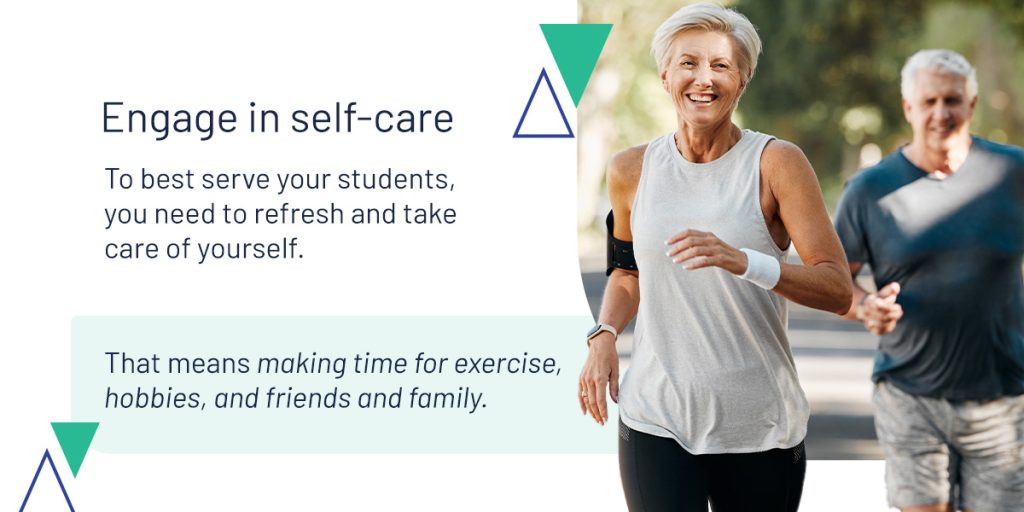
Communication is a fundamental pillar of higher education. Effective communication with students can enhance their learning experience and make their time on campus more meaningful. However, connecting with each student can seem challenging, as each person has different expectations and needs. While you may need to tweak your strategies at times, there are several tips that help you create supportive, productive student-instructor relationships. Discover how to communicate effectively with students so you can improve their experiences and learning outcomes.
1. Start with the positive
Students respond best when they know what they are doing well. Instructors should emphasize how much students—especially nontraditional students—have already achieved just by applying to and starting college. Letting students know how much their hard work—juggling classes, jobs, families—inspires educators can make a huge impact.
It’s often as important to make sure that students know someone believes in them as it is to help them identify specific actions to reach their goals. Positive nonverbal communication is critical, too. When students sense that educators are genuinely interested in them, they are much more likely to open up and partner with them.
2. Create an open line of communication
Students often have concerns or questions that they are afraid to ask. An instructor’s job is to provide a safe space for those questions. This method fosters trust and creates momentum toward finding solutions and achieving success. As coaches, educators build relationships by showing genuine concern, actively listening, and consistently following through in a timely manner. If you are unable to answer students’ questions right away, keep them updated until you can. Once students realize they can rely on you, you become their most important support.
3. Reach out frequently and creatively
Students appreciate frequent communication. The communication with students doesn’t have to be about grades, attendance, or classes—it’s just important to reach out. Instructors should meet students where they are, via email, social media, text, phone—or even in person. This outreach reminds students that you are there whenever they need someone to talk to. It’s not uncommon for students to reply to messages you sent months earlier when they have questions. What’s critical is for students to have your contact information when they need it. You should also offer opportunities for students to seek you out on campus. Office hours are a great way to encourage student-professor connections whether revolving around academic or personal topics.
4. Share some of your personal story
Sharing your priorities, goals, and dreams can make students more comfortable doing the same. This might mean keeping photos and mementos in your office as conversation starters, or sharing stories about overcoming challenges that are similar to the ones students are wrestling with.
Professors have shared accounts of, for example, the difficulties of managing money in college or times feeling afraid to appeal grades. Use these stories to connect with your students and reveal strategies to overcome barriers and resolve issues.
Honesty is key in building any relationship, and that’s why it’s imperative to not only offer students advice about strategies for addressing challenges but also let them know that you experienced similar struggles.
5. Engage in self-care

Success coaching isn’t easy. There’s a learning curve to engaging in student outreach, building rapport, working with faculty, and using technology tools. To best serve your students, you need to refresh and take care of yourself. That means making time for exercise, hobbies, and friends and family. It also means having self-compassion and fostering the ability to admit you’ve made a mistake. You also need the ability to forgive yourself for these mistakes, just as you would forgive your students.
6. Listen with empathy
Sometimes, simply sitting with students on their worst days and giving them a quiet space to process what they’re going through—not trying to fix everything for them— is enough. Some students need comfort, some need support, and some need help planning their next moves. There is no decision tree for this type of work— it depends on individuals working it out together.
Each day presents an opportunity to be a mentor—someone who pours encouragement, inspiration, and confidence into each student’s life. Whether it’s sending weekly emails, texting happy birthday messages, sharing resources, or listening empathetically as someone cries, your students know when you care. This connection helps empower them to achieve their dreams.
7. Practice active listening
Active listening can be one of the most effective ways to communicate with students. This strategy requires you to hear what your students are telling you and show them that their input matters to you. Focus on what your students say to you, and avoid interrupting them while they speak. Ask questions to clarify your understanding, and repeat things back to them to show them you care and understand them. Use verbal and nonverbal cues to indicate your interest in the conversation. Leveraging this strategy not only strengthens your connections with students but aids in enhancing student engagement.
8. Encourage collaboration
Collaboration is essential in higher education. Consistent communication empowers students to interact with new perspectives and become open to new ideas. Encouraging collaboration among peers can also result in enhanced student collaboration with you. As students recognize your value of their opinions, experiences, and questions, they may feel more comfortable expressing their thoughts to classmates and you. Fostering a collaborative environment supports connection-making and student learning by empowering students to speak up and offer suggestions. Find unique ways for students to collaborate. Offer in-class opportunities, use discussion boards, and encourage messaging to empower students to communicate in ways that are meaningful and comfortable to them.
9. Foster a positive environment
Your physical space can also impact your connections with students. Students will be more likely to open up if they feel comfortable and safe. Whether your class meets on campus or online, you can foster a positive environment by:
- Creating a welcoming atmosphere: Creating a welcoming atmosphere encourages students to engage with you and seek services when they need them. Nonverbal and verbal cues like smiling, waving, or greeting students as they enter can make them feel more welcome around you and in your classroom or office.
- Offer proactive support: Regular check-ins, providing contact or resource information, and sending follow-up emails are examples of proactive support. These strategies highlight your commitment to your students and offer solutions for common or ongoing challenges students may be facing.
- Using inclusive materials and language: Enabling students to interact with voices and perspectives different from their own can highlight your commitment to inclusivity and make students feel more comfortable expressing their views and experiences.
10. Be consistent
Communicating with students effectively requires consistency. Students can tell when an educator treats one student differently than the rest, in positive and negative ways. If your students think you play favorites or pick on certain students, they may be less likely to engage with you. Some students may fear becoming a classroom target, while others may find your words and actions ingenuine. Treat each student fairly and with respect. Listen to each student when they speak and express your expectations for the classroom and communication clearly and early.
Engage students with help from Watermark
When educators foster positive student relationships, everyone on campus benefits. Leveraging best practices can create the groundwork for strengthening your relationships, and the right technology can make working with students easier. Watermark Student Success & Engagement is a software solution for connecting with and supporting your students.
Student Success & Engagement empowers student collaboration among peers and with educators, allows students to access institution resources from anywhere, and creates a central location for housing student data. You can leverage this information to create personalized success pathways, intervene at critical moments, and strengthen your communication strategies with students.
Book a demo to learn more about our solutions and how they maximize impact across campus.
















































































































































































































































































































































































































